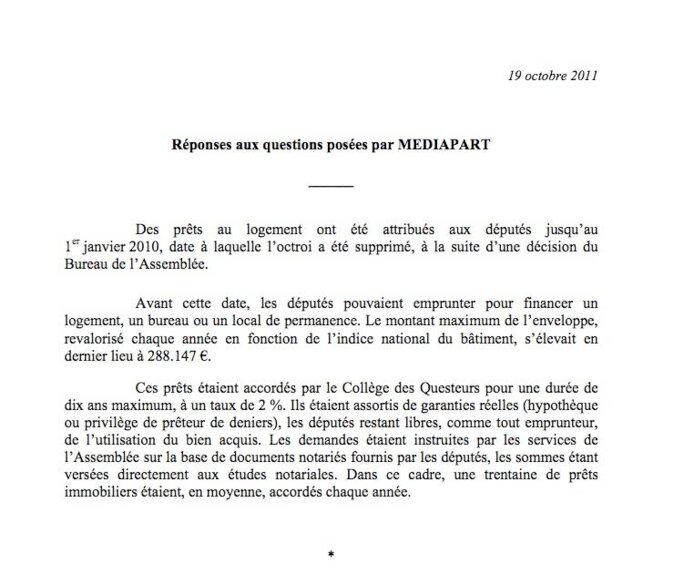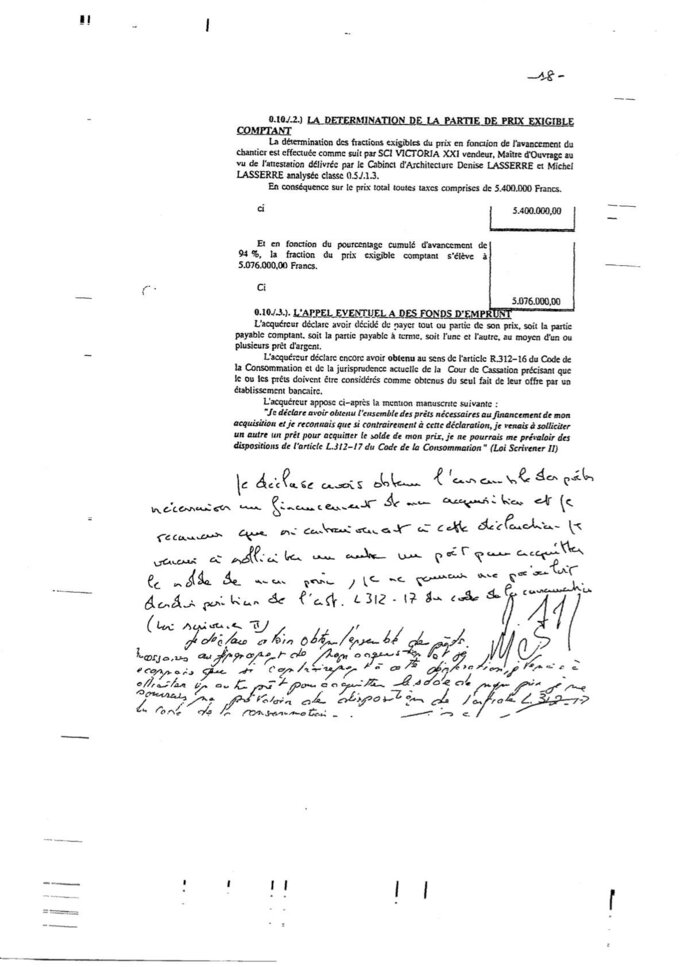President Nicolas Sarkozy has a personal wealth of 2.7 million euros, according to his own declarations made to the French constitutional council (Conseil constitutionnel) and published on March 24th in the Journal officiel, the country’s gazette of official and legal record.
Like all candidates running in this year’s presidential elections, Sarkozy’s private financial situation was made public in a summary that details his bank accounts, life insurance contracts and the worth of his assets.
But mystery surrounds the original financing of a property acquisition upon which a large part of the president’s private wealth is founded. It comes from the proceeds of the sale, before his election, of a 216-square metre, duplex apartment he owned on the île de la Jatte, an island of plush buildings and greenery situated on the River Seine in the upmarket suburb of Neuilly, west of Paris. Sarkozy served as mayor of the town from 1983 until 2002.
The apartment, which he bought in 1997 with his then wife Cécilia, was sold for 1,933,000 euros in 2006.
However, the precise financial conditions of the purchase of the apartment, from a property development company, remain obscure. The company, Lasserre, built the apartment complex and was one of several developers who were sold land on the island belonging to the municipal authorities of Neuilly, reportedly below the market price, when Sarkozy was mayor.
The president has not responded to several approaches from Mediapart for details about the financing of his purchase of the île de la Jatte apartment. On March 29th, Mediapart political affairs reporter Valentine Oberti, camera in hand, attempted to question Sarkozy about the issue while he was on an election campaign walkabout in the Gard département (county) in southern France. The president’s reaction was to place a hand on the camera lens, before Oberti was distanced from him by his security team (click on video below).
Sarkozy discussed the transaction, which in 1997 was made in France’s former currency of francs, in an interview with weekly news magazine L’Express, published on January 24th 2007. He said the apartment was bought for 5.4 million francs (equivalent to 823, 224 euros), financed – beyond his downpayment of a guarantee of purchase of 270,000 francs - by two loans. One of these, he said, was worth 1.6 million francs and came from the Société Générale bank, while the other, for more than 3 million francs, was granted by a financial loan service provided by the French parliament.
Until 2010, Members of Parliament were entitled to seek loans, on comparatively preferential terms, from the National Assembly. Sarkozy was an MP from 1988 to 2005.
Mediapart gained access to the details of the sale agreement, dated October 24th 1997, filed with the registry office of Nanterre, a Paris suburb close to the île de la Jatte. The details of the financing of the purchase are listed on page 20 of the document, as reproduced immediately below:

Enlargement : Illustration 2

The French parliament’s loan system required MPs to offer guarantees against the loans received, as with a mortgage. The Paris solicitors’ professional council, la chambre des notaires de Paris, confirmed to Mediapart that these should appear in the sale agreement drawn up by solicitors. Yet the 1997 sale agreement contains no mention of a loan from the National Assembly.
In a written response (see below) in October 2011 to questions from Mediapart about how the loans for MPs system functioned, the National Assembly replied:
“Property loans were made to MPs up until January 1st 2010 […] Before this date, MPs could borrow for the financing of a habitation, an office or a permanent surgery. The maximum sum of the [loan], revised each year against the national building index, amounted in the last instance to 288, 147 euros."

Enlargement : Illustration 3

Using the French national statistics office (INSEE) records of the national building index (see here), a simple calculation shows that in October 1997, when Sarkozy purchased the apartment, an MP was not entitled to borrow more than the equivalent of 196,000 euros, representing 1.183 million francs. That cap represents little more than a third of what Sarkozy claimed he had been loaned by the National Assembly.
A 3 million-franc mystery
Banking secrecy laws prevent public access to the details of individual loan agreements between the National Assembly and MPs. Only a magistrate in charge of a judicial investigation concerning a loan can gain specific details.
In its latest report published in January, the official French watchdog for financial transparency among MPs, ministers and the heads of publicly-owned corporations, La commission pour la transparence financière de la vie politique, denounced the lack of accountability regarding the acquisition of property by MPs. The commission complained it had no powers for the proper investigation of the details of loans cited by MPs in their wealth declarations, effectively preventing it from engaging in an effective control of illegal personal enrichment during mandates.
The October 1997 sale agreement for Sarkozy’s purchase of the apartment on the île de la Jatte contains the following observation (see document below):
“The purchaser declares having decided to pay all or part of the price, whether the sum to be paid cash, whether the sum to be paid over time, either one or the other, by the means of one or several money loans.”

Enlargement : Illustration 4

Following this is a handwritten note signed by Nicolas Sarkozy which reads: “I declare that I have obtained all of the loans necessary for the financing of my purchase and I recognise that if, contrary to this declaration, I was to solicit another a loan [sic] to settle the account of [the sale], I will not be entitled to the dispositions of article L312-17 of the consumer law.”
In substance, this note added by Sarkozy says that he will look after finding any extra money necessary for his purchase. But there is no detail of how he will do this, beyond the 270,000 francs handed over in the initial guarantee of purchase agreement, and the 1.6 million francs lent to him by the Société Générale bank.
More than 15 years later, there is no information available about how he financed the 3 million francs that remained to be found for the transaction which, by his own declarations, established a large part of what is today his personal fortune.
Bargain deals
In March 2007, during the presidential election campaign, investigative weekly Le Canard enchaîné reported that the 5.4-million franc purchase price was between 12% and 35% below that of other sales of apartments in the same building, built and sold by the property development group Lasserre, during the same period. It also reported that Lasserre agreed to offer the Sarkozy’s further building work on the apartment, valued at a total of 925,000 francs.
Lasserre, which built three buildings on the island, benefitted from several land purchases in Neuilly while Sarkozy was mayor. Le Canard enchaîné said Lasserre was sold land on the island at 20% below market value, representing a total saving of 5,080,000 francs (equivalent to 775,000 euros).
Following the reports in the Canard enchaîné, Sarkozy said that his town hall “faced in 1997 a collapse of the property market” and that land “comparable” to that sold to Lasserre was sold to other developers “at lower prices”. He denied having benefitted from a preferential purchase price for the apartment, adding that it was in line with the index provided in a special report he commissioned, at the time of the transaction, from the local fiscal authorities. The report was never revealed in public.
The absence of any coherent explanation of the financing of his purchase of the apartment on the ile de la Jatte leaves several crucial questions unanswered. If the 3 million francs unaccounted for in the purchase were provided by a bank loan or from his personal wealth, they should have been noted as such in the sale agreement. Which raises the possibility that an acquaintance leant him the money; in which case who, and at what rate? There remains the possibility that it was the development company which offered him the 3 million francs, which would represent a sale price that was 75% below the market value. Whatever the case, the major question is why have the details been kept so secret.
-------------------------
English version: Graham Tearse


